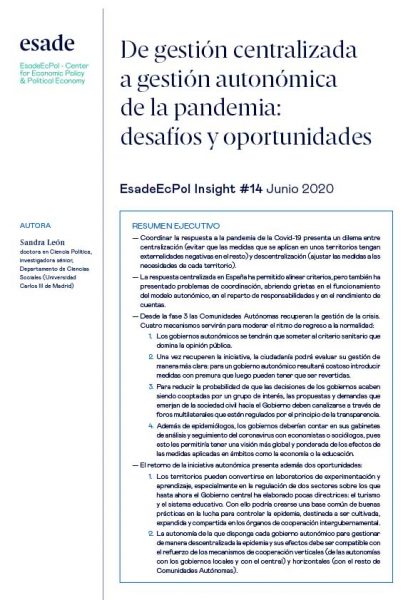
insight Covid-19
From centralised management to regional management of the pandemic: challenges and opportunities
Sandra León
12 Jun, 2020
EsadeEcPol | Policy Insight
Executive summary
- Coordinating the response to the Covid-19 pandemic involves a dilemma between centralisation (preventing measures taken in some regions having a negative impact on others) and decentralisation (adapting measures to the needs of each region).
- Spain’s centralised response has enabled the alignment of criteria but it has also brought coordination problems, causing cracks in the modus operandi of Spain’s model of autonomous regions, the distribution of responsibilities and the accountability of the autonomous regional governments.
- As the autonomous regions move into phase 3 and the state of emergency comes to an end, they regain initiative about the management of the crisis. There are four principles to ensure that decisions regarding the return to normality are implemented at the right pace:
- Regional governments will need to comply with health safeguards prevailing in public opinion.
- Once they regain initiative, citizens will be able to evaluate their management more clearly: it may be more costly for a regional government to implement measures too soon and then have to reverse them.
- To reduce the likelihood of government decisions being co-opted by a stakeholder, the proposals and demands made by civil society upon the government must be channelled via multilateral forums based on the principle of transparency.
In addition to experts in infectious diseases, governments must include economists and sociologists in their analysis and monitoring cabinets because this will enable them to have a more global, balanced vision of the impact of the measures implemented in spheres such as the economy or education.
- A regional approach also brings two opportunities:
- Regions can become laboratories for experiments and learning, particularly regarding the regulation of two sectors for which Spain’s central government had, until now, issued few directives: tourism and the education system. This could create a common pool of good practices as part of the efforts to contain the epidemic, and this pool of knowledge must be cultivated, expanded and shared amongst the entities of intergovernmental cooperation.
- The autonomy of each regional government regarding the decentralised management of the epidemic and its fallout must tally with bolstering vertical cooperation mechanisms (between autonomous regions and local governments and central government) and horizontal cooperation mechanisms (with the other autonomous regions).

Read the full article:

Sandra León
PhD in political science and senior researcher in the Social Science Department (Universidad Carlos III, Madrid)
View profile

